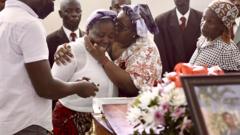The funeral of Antonio Juaqim in Maputo, Mozambique, has become a haunting symbol of the country’s volatile political climate as children mourn the loss of their 16-year-old friend, who was shot while joining a pot-banging protest organized by the opposition. Antonio was killed during a demonstration opposing the recent presidential election results, which saw the ruling Frelimo party, in power for 49 years, declared the victor by the electoral commission with 71% of the vote.
His uncle, Manuel Samuel, recounted the gruesome details, stating, "Antonio was shot in the mouth, and the bullet went through the back of his head," revealing that CCTV footage showed police targeting protesters. Antonio's death has drawn attention to the political unrest fueled by allegations of electoral misconduct, spearheaded by opposition candidate Venâncio Mondlane, who accused the government of rigging the election results.
On November 15, the protests erupted as citizens across the capital and beyond began banging pots and pans to express their dissent. Initially seen as a movement for change, the night turned tragic for many, with Antonio’s death marking a turning point that has since forced many to retreat to their homes for safety, continuing their protests from within.
At Antonio's funeral just days later, the emotional toll was evident as relatives and friends remembered him as a hopeful child cut down by violence. At least six other young victims were reportedly found in the morgue, underscoring the tragic outcome of these protests. According to campaign group Human Rights Watch, approximately 40 individuals have died, including children, during the demonstrations that unfolded in the wake of the election.
Mozambique’s police officials expressed condolences to the grieving families but deflected responsibility for the children's deaths, accusing protesters of using them as shields. The police commander proclaimed that they responded out of necessity amid escalating violence, claiming numerous police officers were also injured.
Contrarily, opposition figures like Albino Forquilha criticized the police for their excessive use of force against unarmed citizens. Many young people in Mozambique feel neglected by the Frelimo party, yearning instead for financial independence and genuine representation.
Following the announcement of the election results, Frelimo's candidate Daniel Chapo denied any wrongdoing, asserting their victory was legitimate. Chapo has since maintained a low profile while awaiting the court's decision on the opposition's challenge against the election outcome.
The ongoing unrest reflects a deep discontent among the Mozambican youth, who are more concerned with jobs and opportunities than historical legacies of independence. With the nation in turmoil, the loss of young lives has sparked widespread grief and calls for justice amidst a struggle for a future free from fear and oppression.























